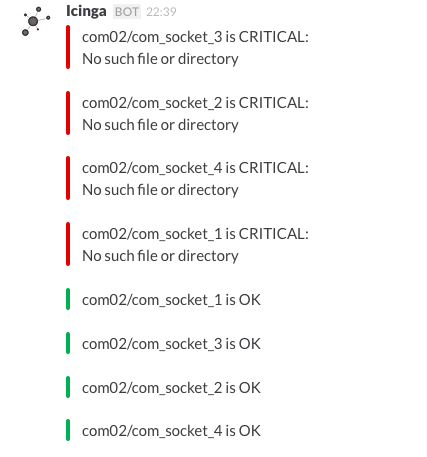Since we’ve been using Slack for communication inside our team, I’ve started to play with different integrations. There are two ways to integrate Slack with Nagios-based monitoring systems. The first one is to use general connectors and write a custom script. The second one is to use the built-in Slack bot for Nagios. This option is better, because it gives a better integration level. In Slack, the documentation only describes how to setup this bot for Nagios or Icinga1 and there is nothing about Icinga2.
So, to setup Nagios integration follow these steps:
- For CentOS or RHEL system we first need to install some requirements:
yum install perl-libwww-perl perl-Crypt-SSLeay perl-LWP-Protocol-https
- Download this plugin:
wget https://raw.github.com/tinyspeck/services-examples/master/nagios.pl -O /etc/icinga2/scripts/slack_nagios.pl
chmod 755 /etc/icinga2/scripts/slack_nagios.pl- Edit
slack_nagios.pland add proper values to the$opt_domainand$opt_tokenvariables. - Edit
/etc/icinga2/conf.d/commands.conf:
object NotificationCommand "slack-host-notification" {
import "plugin-notification-command"
command = [ SysconfDir + "/icinga2/scripts/slack_nagios.pl" ]
arguments = {
"-field" = "$user.vars.host_fields$"
}
}
object NotificationCommand "slack-service-notification" {
import "plugin-notification-command"
command = [ SysconfDir + "/icinga2/scripts/slack_nagios.pl" ]
arguments = {
"-field" = "$user.vars.service_fields$"
}
}If you pass env variables with this command, Icinga2 will not propagate it to
the script, so you must pass everything with -field key. If you only pass the
slack_channel value to the script, Nagios bot will post only empty messages
to the channel.

If you define multiple entries for -field key, Icinga2 will only use the last
one, suppressing the others.
Here you’ll need to define an array with those fields.
[2015-08-31 22:36:50 +0200] notice/Process: PID 19582 ('/etc/icinga2/scripts/slack_nagios.pl' '-field' 'NOTIFICATIONTYPE=RECOVERY') terminated with exit code 0And surprisingly, you can’t define an array in the NotificationCommand definition, so something like this
"-field" = ["a", "b, "c"]
will give you nothing but errors.
However, you can define an array in another object definition connected to the NotificationCommand.
We’ll define this variables in User object.
- Edit
/etc/icinga2/conf.d/users.confand add this lines:
object User "slack" {
display_name = "Slack"
import "generic-user"
vars.host_fields = ["slack_channel=#ops", "HOSTALIAS=$host.display_name$", "HOSTSTATE=$host.state$", "HOSTOUTPUT=$host.output$", "NOTIFICATIONTYPE=$notification.type$"]
vars.service_fields = ["slack_channel=#ops", "HOSTALIAS=$host.display_name$", "SERVICEDESC=$service.name$", "SERVICESTATE=$service.state$", "SERVICEOUTPUT=$service.output$", "NOTIFICATIONTYPE=$notification.type$"]
}Replace #ops with the name of your channel.
- Add following lines to
/etc/icinga2/conf.d/notifications.conf:
apply Notification "slack-host" to Host {
import "slack-host-notification"
users = [ "slack" ]
assign where host.vars.sla == "24x7"
}
apply Notification "slack-service" to Service {
import "slack-service-notification"
users = [ "slack" ]
assign where service.vars.sla == "24x7"
}and this to /etc/icinga2/conf.d/templates.conf:
template Notification "slack-host-notification" {
command = "slack-host-notification"
states = [ Up, Down ]
types = [ Problem, Acknowledgement, Recovery, Custom,
FlappingStart, FlappingEnd,
DowntimeStart, DowntimeEnd, DowntimeRemoved ]
period = "24x7"
}
template Notification "slack-service-notification" {
command = "slack-service-notification"
states = [ OK, Warning, Critical, Unknown ]
types = [ Problem, Acknowledgement, Recovery, Custom,
FlappingStart, FlappingEnd,
DowntimeStart, DowntimeEnd, DowntimeRemoved ]
period = "24x7"
}- Validate your configs with
icinga2 daemon -Cand restart/reload the servicesystemctl reload icinga2 - Check that your notifications are working.
[2015-09-01 02:31:11 +0200] notice/Process: PID 12654 ('/etc/icinga2/scripts/slack_nagios.pl' '-field' 'slack_channel=#ops' '-field' 'HOSTALIAS=edu01' '-field' 'SERVICEDESC=load' '-field' 'SERVICESTATE=OK' '-field' 'SERVICEOUTPUT=OK - load average: 4.72, 5.71, 7.90' '-field' 'NOTIFICATIONTYPE=RECOVERY') terminated with exit code 0
- Don’t forget to enable the Nagios bot in Slack for your team.
Enjoy your teamwork!
Published on 01 Sep 2015 • Written by Roman Komkov

